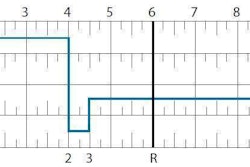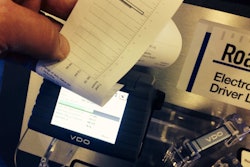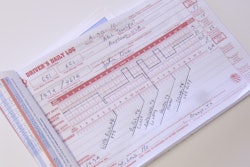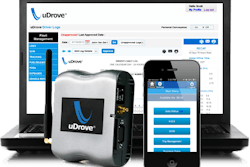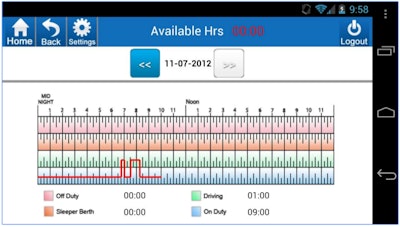
The Load Logistics company was the first provider of an electronic logging device solution to appear on the Federal Motor Carrier Safety Administration’s online device registry, which went live on Feb. 16. As with the other two companies listing their devices on the registry today, Load Logistics had not been covered before in either Overdrive or its sister fleet publication CCJ. When reached by phone last week, it became clear just why not: The company’s transportation management software’s ELD component is a relatively new addition to the market for such devices and has been run only in a limited number of trucking operations.
Company rep Nathan Self says Load Logistics has two small fleets, including Covington, Ga.-based Tri Star Transfer, “running it to get the kinks worked out. We’re just now getting ready to come out with [the software] — there’s been a lot of time and thought put into it.”
The Atlanta-area-based company plans a daylong seminar March 10 at the Holiday Inn in Covington, Self adds, as something of an unveiling of the system for fleets in the area and elsewhere.
Load Logistics on its website characterizes its listing in FMCSA’s device registry as evidence it has been “approved by the FMCSA,” but a close look at the device registry itself tells a different story. The list of “Registered ELDs” is provided there with this caveat: “These devices are self-certified by the manufacturer and not by the Federal Motor Carrier Safety Administration.”

The ELD final rule, nonetheless, requires truckers subject to the rule to use one of the devices listed in the registry when the compliance date rolls around in December 2017, unless they were already using a 395.15-compliant Automatic Onboard Recording Device (AOBRD). With pre-compliance-date AOBRD use, carriers have an additional two years before they are required to utilize one of the registered devices.
The Ohio Trucking Association, in its comments on the ELD final rule, objected to the device registration and certification process as proposed and adopted, for reasons of a lack of true approval of the devices by the agency absent an after-the-fact investigation of the device. Given the self-certification process in place, the agency is relying on the market in some ways to police itself on the technical specifications for the devices — at least initially.
 Access details on the three currently registered ELD providers via this link. If FMCSA is not exactly “approving” the devices, it is at least requiring that providers supply a wealth of product information in order that observers can make the determination of whether or not the devices comply. All of that information, including compliance tests and driver guides, is available for each supplier on the FMCSA’s device registry. As more devices are added, Overdrive will update its own comparison chart in future to reflect whether or not the device is included on FMCSA’s device registry.
Access details on the three currently registered ELD providers via this link. If FMCSA is not exactly “approving” the devices, it is at least requiring that providers supply a wealth of product information in order that observers can make the determination of whether or not the devices comply. All of that information, including compliance tests and driver guides, is available for each supplier on the FMCSA’s device registry. As more devices are added, Overdrive will update its own comparison chart in future to reflect whether or not the device is included on FMCSA’s device registry.The final rule summarizes the OTA’s objection to the self-certification process this way: OTA argued “that it would expose carriers to considerable risk. If a device is later held to be noncompliant, the carrier would have a fleet of vehicles that might need to be taken off the road. OTA stated that FMCSA should provide assurance that a carrier is not at risk of having to replace a registered product or have its logs declared invalid.”
FMCSA responded to such concerns by outlining a process by which devices could be removed from the registry if found noncompliant. That process, crucially, offers the ELD provider the opportunity to correct the issue and thus perhaps relieve the burden on carrier customers.
Truckstop.com’s manager for mobile services, Thayne Boren, participated in the FMCSA online seminar last week for providers of electronic logging device equipment and services. He noted the agency spelled out one avenue for enforcing device compliance that might rely heavily on observations at roadside to spur investigations. The agency “essentially said that if a DOT officer were to pull over someone and they deemed that particular ELD solution” to be noncompliant, Boren said, then an investigation into the device would be initiated.
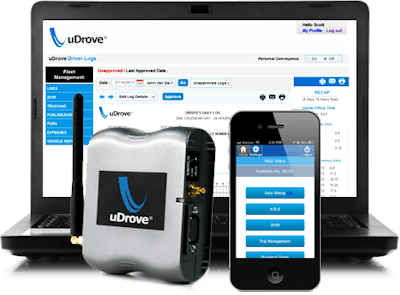 uDrove updated the pricing of its AOBRD device recently to reflect its most recent market assessments. The basics of the new pricing structure are available via Overdrive‘s updated ELD comparison chart at this link.
uDrove updated the pricing of its AOBRD device recently to reflect its most recent market assessments. The basics of the new pricing structure are available via Overdrive‘s updated ELD comparison chart at this link.On the device registry today, “none of the big names” in electronic hours of service compliance are listed there, Boren said, noting that he suspected most well-known electronic-log providers, like Truckstop.com’s own uDrove e-log, continued to work to “engage the DOT and FMCSA and get the device certified.”
“We want to submit it right the first time,” Boren says.
If you’re a carrier not running AOBRDs today and treading into the market for e-logs, do so carefully. If you have any doubt about the ability of a provider to conform to the technical specifications in the ELD final rule, do everything in your power to confirm the device’s compliance yourself. That might include, among other things, conversations with the provider and other carriers already utilizing the device and software, user reviews of the device (such as those provided for some by readers at Overdrive sister site CCJ, all of which are linked from Overdrive‘s comparative chart of a wide array of e-log providers) and conversations with FMCSA itself.
Waiting for refinements to the device registry itself may be prudent, too, as the ELD market sorts itself out ahead of the mandate.

